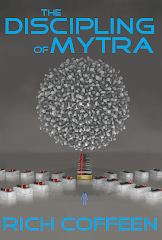Would it be OK for the deacons of my church to wear police uniforms and weapons, patrol the streets, and arrest criminals? Would it be acceptable for the deacons to charge, try, and punish these criminals? I think most would agree that such behavior would be unacceptable, that such an effort on the part of the church to do the state's job would, in fact, violate the separation of church and state.
This introduces the idea of sphere sovereignty. Each covenantal unit - individual, church, family, and state - has been delegated certain responsibilities by God. A unit may not perform duties assigned by God to one of the other units. This doctrine is based upon the idea that the Bible is an express powers document: unless the Bible says the church, family, or state can perform a given task, it is understood that only individuals can perform that task. A social institution cannot do something unless the Bible explicitly says it can.
Here are the basic duties assigned to each covenantal unit:
Individual - repent and believe the gospel (Mk 1:15)
Church - make disciples of all nations (Mt 28:18-20)
Family - fill and subdue the earth (Gen 1:26-28)
State - bear the sword (Rom 13:4-5)
I believe in the separation of church and state, meaning I believe that the church may not perform those duties assigned by the Bible to the state, and that the state may not perform those duties assigned by the Bible for the church. The church may not engage in police functions, arresting and trying criminals. The church may not maintain a military for defending the country's borders. Likewise the state may not engage in charity work, caring for the poor, orphans, widows, and aliens. The state may not teach people how to think about themselves or the world around them.
Sphere sovereignty teaches separation between all four covenantal units, not just between church and state. For example, according to the Bible charity is first and foremost the responsibility of the family. Only if family cannot help a person in need is the church to get involved. Thus government welfare programs violate the separation of family and state. Again, the Bible assigns the education of children to the family. Public schools likewise violate the separation of family and state.
Vigilantes (think superheroes) violate the separation of individual and state, since the Bible gives the government a monopoly on violence. Businesses are an outgrowth of families and households. Thus government involvement in the economy (running a central bank, printing money, intervening in the market in any way) violates the separation of family and state. Church schools destroy the separation of family and church (parents may not delegate their children's education to the church any more than they may delegate it to the state).
Humanism promotes a messianic view of the state, meaning the state is thought of as a redemptive institution. In other words, according to humanists (except the anarchist variety, of course) the state's job is to save people. Through education, welfare, the ever-expanding reach of social workers, and massive manipulation of the economy, the state can make everyone happy, wealthy, and well-adjusted. As Christians look to Christ and the Holy Spirit to transform lives, so humanists look to the government to do the same.
The doctrine of sphere sovereignty smashes this messianic view of politics. According to the Bible, the state is to exercise an extremely limited role in people's lives. Basically, the government's job is to kill people: criminals within the borders, and military enemies beyond the borders. This is a strictly negative role for the government. The state enforces the law, maintains order, protects private property, and keeps people safe - especially from itself. For in the end, the state is the greatest threat to the happiness and prosperity of its people. More people in human history have had their lives ruined by their own government than by famine, disease and war combined.
Friday, October 2, 2009
Subscribe to:
Comments (Atom)
